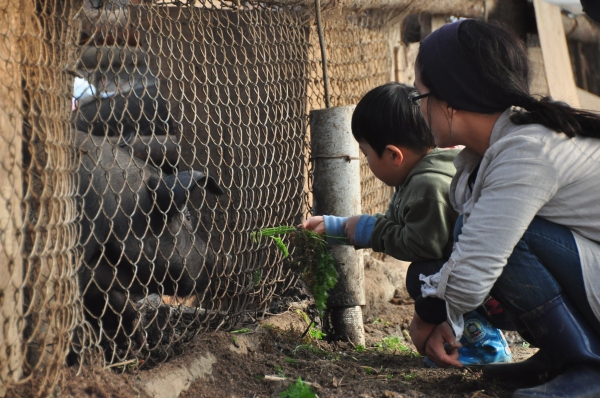After years of making documentaries, filmmaker and animal lover Hwang Yun (황윤) hung up her camera in order to get married and start a family. Yet not long after the birth of her son, the foot-and-mouth disease epidemic spread across Korea resulting in the culling of thousands of pigs alongside other farmyard animals. Having previously had little concern for pigs, director Hwang suddenly found herself preoccupied with their plight. The questions swirling in her mind prompted the director to contact farms in order to film the arising situations and, after finally obtaining permission, she gathers her camera and embarks on documenting the life of pigs.
An Omnivorous Family’s Dilemma (잡식가족의 딜레마) is a charming and heartfelt family documentary, as well as a highly enjoyable and educational experience. The approach that director Hwang takes in exploring the life of pigs is key to what the film so endearing. She is not simply an animal activist but a concerned mother and Korean citizen, and in employing this perspective an ‘everyperson’ quality is informed that makes the documentary highly accessible and compelling. As such the issues director Hwang encounters appear wholly natural, as she has no definitive agenda as such but simply lets her curiosity guide her. Ironically however this also holds the documentary back from being more powerful and thought-provoking, as the inclusion of greater investigative journalism would have undoubtedly bolstered her arguments regarding pig farming.
Director Hwang is initially motivated out of concern for the foot-and-mouth epidemic that swept Korea, which ultimately informs her debate between factory and free range farming. Scenes from the factory farms she visits are as abominable as they are powerful, depicting pigs confined to grotesque, tiny cages in which they eat, sleep, are artificially inseminated, rear young, and ultimately die. The imagery frequently calls forth comparisons with concentration camps, yet the most horrific scenes occur during the mass culls in which hundreds of live, squealing pigs are crushed and buried alive. Director Hwang’s vision pertinently captures a strong indictment of not of the barbarism of factory farming, but also the demand for meat in society at any cost.
Yet the factory farm scenes are generally kept to a minimum in order to explore the living conditions of free range pigs. It is during such scenes that director Hwang employs a strong focus on family, by bringing her young son to educate him whilst simultaneously forming relationships with a farrow of piglets. The benefits of free range farming, as well as her son’s development, are wonderfully captured and are ultimately why An Omnivorous Family’s Dilemma is so entertaining. Watching director Hwang and her son learn the basics of pig farming and then later struggling with pork in their diet is humourous take on the moral dilemma, and watching the conflicts that arise within the family are amusing and thought-provoking throughout.
Verdict:
An Omnivorous Family’s Dilemma is a charismatic and enjoyable documentary about pig farming in Korea. This is chiefly due to the perspective director Hwang Yun employs, who approaches the issues not only as an animal rights activist but also as a wife and mother. The contrasts between factory and free range farming are powerful and thought-provoking, yet it is the development of director Hwang’s son and their dietary dilemmas regarding pork that form the core entertainment. While An Omnivorous Family’s Dilemma would undoubtedly benefit from greater investigative journalism, the documentary is a gentle and heartfelt viewing experience.
★★★☆☆
















